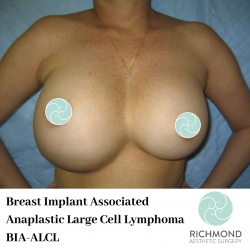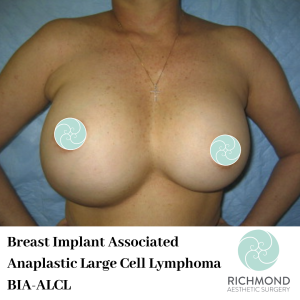Survivors Ask FDA to Ban Textured Breast Implants Due to Rare Cancer Link; Dr. Neil J. Zemmel, Richmond Aesthetic Surgery, Respected Plastic Surgeon Agrees
A Plastic Surgeon who diagnosed one of the earliest known cases of Breast Implant Associated Anaplastic Large Cell Lymphoma says the risks are too high with textured breast implants.

Richmond, VA, March 27, 2019 --(PR.com)-- Board Certified Plastic Surgeon, Neil J. Zemmel MD, FACS www.richmondplasticsurgery.com, was a young resident doctor at Virginia Commonwealth University Medical Center when he first saw Breast Implant Associated Anaplastic Large Cell Lymphoma or BIA-ALCL. It was 2003 when a patient came to him and fellow resident Michael Newman MD, FACS for treatment. The patient was a 52 year old woman who had ruptured silicone implants. One of her breasts was almost double the size of the other - she was swollen with fluid that had built up around the implant. As part of the diagnostic workup, the doctors sent the fluid for testing. The fluid was positive for cancer cells. Their patient had ALCL of the breast, one of the first ever diagnosis of this rare form of cancer.
For the past 2 days the U.S. Food and Drug Administration has been listening to multiple women testify in a breast implant safety hearing. These women shared their personal stories of being diagnosed with BIA-ALCL. Dawn Criss from Alberta, Canada asked the FDA to “Please take textured breast implants off the market,” saying “Cancer is a hard reality for many of us to deal with. It affects not only our bodies, but our minds, relationships our working ability and our own sense of security. It takes away hope.”
BIA-ALCL is a cancer of the immune system that grows in the scar tissue surrounding textured breast implants. 457 women in the U.S. have been diagnosed with BIA-ALCL with all of those cases being linked to textured breast implants. Removing the scar tissue and the textured implant generally cures the cancer if caught early enough but 17 women worldwide have died with the disease.
Textured breast implants have a “sandpaper” like surface (as opposed to smooth). Zemmel says that textured implants are outdated and with the associated risk of BIA-ALCL they should be removed from the market.
“I do not use textured breast implants. They came into being in the late 1980’s and 1990’s as a response to the high capsular contracture rates that were found at that time. Manufacturers found that texturing the implants would create a ‘Velcro’ like effect between the implants and the overlying tissue reducing the rate of capsular contracture. We now know that going under the muscle for breast implant is the single most important factor in reducing capsular contracture. In my opinion, texturing of silicone or saline implants is an obsolete technology that no longer has a use.”
Smooth breast implants are much more commonly used in the United States with only about 12 percent of U.S. women with breast implants having textured. While only a minuscule amount of those women will develop BIA-ALCL, Dr. Zemmel says the risk of using textured implants is still is too high and that smooth implants are the safe and effective choice.
“This type of cancer is extraordinarily rare. To date there have been a little more than 700 cases described worldwide - out of the tens of millions of women with breast implants and over 40 years of breast implant surgery. However, it is concerning and we need to absolutely track it and be extremely vigilant as surgeons and doctors in monitoring these women, but given how rare this event is, I feel that in my practice and in general, smooth breast implants are still a safe and effective treatment.”
Textured implants have been taken off the market in Europe and Brazil but are still available in the U.S. and Canada.
Dr. Zemmel co-authored a Journal of Plastic, Reconstructive & Aesthetic Surgery article about his patient diagnosed with ALCL of the breast. That article can be found at https://www.jprasurg.com/article/S1748-6815(07)00216-1/fulltext
For more information or to schedule an interview with Dr. Zemmel, please contact:
Andrea Emery @ (804) 312-4102.
Neil J. Zemmel MD, FACS is the founder and CEO of Richmond Aesthetic Surgery in Richmond, Virginia. www.richmondplasticsurgery.com
Dr. Zemmel is a Board Certified Plastic and Reconstructive Surgeon who offers a full breath of cosmetic and reconstructive surgeries. He is known throughout Virginia and the Mid-Atlantic for having particular expertise in breast augmentation and advanced reconstruction and breast revision procedures. Dr. Zemmel performs cosmetic surgery of the breast, face and body as well as reconstructive procedures of the breast, face, trunk and extremities. Known for his compassion and excellent bedside manner, he has won numerous “Top Doc” awards in Richmond and statewide. Dr. Zemmel has appeared in the local, national and international media as an expert authority on plastic surgery. He received his education at William and Mary, UVA’s School of Medicine and completed a 6 year Plastic and Reconstructive Surgery program at Virginia Commonwealth University Medical College Virginia.
Dr. Zemmel is a Diplomate of the American Board of Plastic Surgery, obtaining this prestigious Board Certification in 2006. He is an active member of the American Society of Plastic Surgeons, the American Society for Aesthetic Plastic Surgery, and is a Fellow of the American College of Surgeons. He is also is a member of the Medical Society of Virginia.
Richmond Aesthetic Surgery
11934 W Broad Street Suite 200,
Richmond, VA 23233
Instagram: @RichmondPlasticSurgery @Doc_RVA @DermloungeRVA
Facebook: RichmondAestheticSurgery
For the past 2 days the U.S. Food and Drug Administration has been listening to multiple women testify in a breast implant safety hearing. These women shared their personal stories of being diagnosed with BIA-ALCL. Dawn Criss from Alberta, Canada asked the FDA to “Please take textured breast implants off the market,” saying “Cancer is a hard reality for many of us to deal with. It affects not only our bodies, but our minds, relationships our working ability and our own sense of security. It takes away hope.”
BIA-ALCL is a cancer of the immune system that grows in the scar tissue surrounding textured breast implants. 457 women in the U.S. have been diagnosed with BIA-ALCL with all of those cases being linked to textured breast implants. Removing the scar tissue and the textured implant generally cures the cancer if caught early enough but 17 women worldwide have died with the disease.
Textured breast implants have a “sandpaper” like surface (as opposed to smooth). Zemmel says that textured implants are outdated and with the associated risk of BIA-ALCL they should be removed from the market.
“I do not use textured breast implants. They came into being in the late 1980’s and 1990’s as a response to the high capsular contracture rates that were found at that time. Manufacturers found that texturing the implants would create a ‘Velcro’ like effect between the implants and the overlying tissue reducing the rate of capsular contracture. We now know that going under the muscle for breast implant is the single most important factor in reducing capsular contracture. In my opinion, texturing of silicone or saline implants is an obsolete technology that no longer has a use.”
Smooth breast implants are much more commonly used in the United States with only about 12 percent of U.S. women with breast implants having textured. While only a minuscule amount of those women will develop BIA-ALCL, Dr. Zemmel says the risk of using textured implants is still is too high and that smooth implants are the safe and effective choice.
“This type of cancer is extraordinarily rare. To date there have been a little more than 700 cases described worldwide - out of the tens of millions of women with breast implants and over 40 years of breast implant surgery. However, it is concerning and we need to absolutely track it and be extremely vigilant as surgeons and doctors in monitoring these women, but given how rare this event is, I feel that in my practice and in general, smooth breast implants are still a safe and effective treatment.”
Textured implants have been taken off the market in Europe and Brazil but are still available in the U.S. and Canada.
Dr. Zemmel co-authored a Journal of Plastic, Reconstructive & Aesthetic Surgery article about his patient diagnosed with ALCL of the breast. That article can be found at https://www.jprasurg.com/article/S1748-6815(07)00216-1/fulltext
For more information or to schedule an interview with Dr. Zemmel, please contact:
Andrea Emery @ (804) 312-4102.
Neil J. Zemmel MD, FACS is the founder and CEO of Richmond Aesthetic Surgery in Richmond, Virginia. www.richmondplasticsurgery.com
Dr. Zemmel is a Board Certified Plastic and Reconstructive Surgeon who offers a full breath of cosmetic and reconstructive surgeries. He is known throughout Virginia and the Mid-Atlantic for having particular expertise in breast augmentation and advanced reconstruction and breast revision procedures. Dr. Zemmel performs cosmetic surgery of the breast, face and body as well as reconstructive procedures of the breast, face, trunk and extremities. Known for his compassion and excellent bedside manner, he has won numerous “Top Doc” awards in Richmond and statewide. Dr. Zemmel has appeared in the local, national and international media as an expert authority on plastic surgery. He received his education at William and Mary, UVA’s School of Medicine and completed a 6 year Plastic and Reconstructive Surgery program at Virginia Commonwealth University Medical College Virginia.
Dr. Zemmel is a Diplomate of the American Board of Plastic Surgery, obtaining this prestigious Board Certification in 2006. He is an active member of the American Society of Plastic Surgeons, the American Society for Aesthetic Plastic Surgery, and is a Fellow of the American College of Surgeons. He is also is a member of the Medical Society of Virginia.
Richmond Aesthetic Surgery
11934 W Broad Street Suite 200,
Richmond, VA 23233
Instagram: @RichmondPlasticSurgery @Doc_RVA @DermloungeRVA
Facebook: RichmondAestheticSurgery
Contact
Richmond Aesthetic Surgery
Andrea Emery
(804)312-4102
www.richmondplasticsurgery.com
Andrea Emery
(804)312-4102
www.richmondplasticsurgery.com
Multimedia

Textured Implants and Rare Cancer link
Cancer survivors and respected Plastic Surgeon agree Textured Breast implants should be banned, saying health risks are too high.

BIA-ALCL
Photo of woman diagnosed with ALCL
Categories
